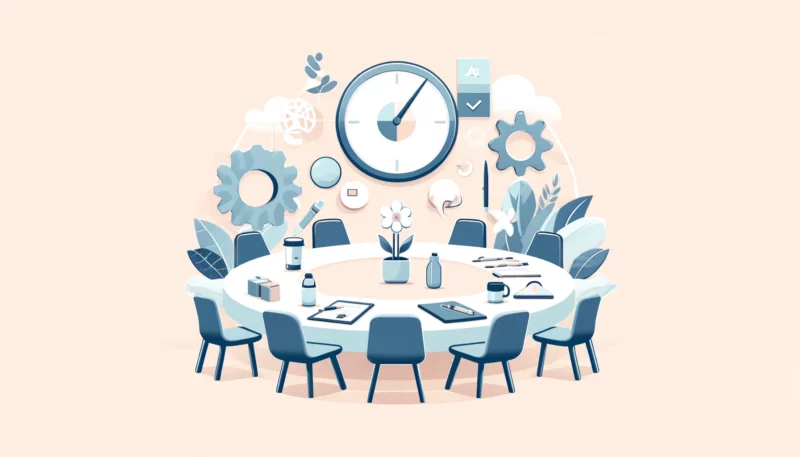Team development can be quickly disrupted when making decisions in a team. Maybe you know that? There is an important team decision to be made, but after the meeting do you feel like you haven't really been heard and overall does everything feel a bit like a lazy compromise? Then you are not alone! Because many team decision-making processes are far less structured and rational than they should be. Here you will learn about seven typical thinking mistakes, the reflection of which will help you with team development and team decisions:
1. Mistake in thinking: alternative blindness
Star investor Warren Buffett is an exception in his thinking because he is not blind to the alternative eye. He follows the principle, "Each of our deals is measured by the second best deal that is possible at a certain time - even if it means doing more of what we already do." But the buffets of this world are few and far between We ordinary people have a strong tendency not to compare option A with its alternatives B to F, but with the status quo. For example, it can happen that an empty room in the office building is converted into another storage room, with the reason: "Better a storage room than not using the space at all." You shouldn't have to ask yourself whether a storage room is better than vacancy, but better than a relaxation room for the employees or a noise-insulated office for the frequent caller or, or, or ...
2. Mistake in thinking: Salience effect
The most obvious, the most salient characteristic is not necessarily the decisive one and should therefore not be weighted as such. And yet we often allow ourselves to be blinded by shrill information and apparent connections. For a high quality decision we should always consult all available information and not only the quickly available one. For example, the applicant looks very attractive - and we find him likeable. Does that really make sense? This is an important effect when “shaping team development” is on the agenda.
3. Mistake in thinking: social proof
Just because a lot of people say something is not automatically true. Just because a lot of people buy a product doesn't mean it's high quality. And just because a lot of people make the same decision, it's not automatically good. Because even if it makes sense from an evolutionary point of view to orientate yourself on the behavior of other people, this endeavor can lead us to absurd concessions in decision-making situations. Ever heard of the Solomon Ash experiment? No? Then you can right here Read everything about it and gain further exciting insights into group thinking.
4. Mistake in thinking: Authority bias
Would you give someone extremely electric shock just because an expert in a white coat tells you to do it? Your inner answer is hopefully no, but psychological experiments (including Milgram, 1978) and history have shown that we humans are very susceptible to authority bias and that experts trust and follow almost blindly. This can be fatal for us when making decisions in a team. Therefore, always check statements and suggestions for their content quality and don't let white coats, expensive suits and a supposed expert status blind you. It should always be about what was said and not who said it!
5. Thinking mistake: Not-Invented-Here syndrome
How often do you think about your own ideas? What a brainstorm! or “Million Dollar Idea!”? And how often does something big really come out of these ideas? Exactly 🙂 We have a pronounced tendency to disproportionately applaud our own ideas and our own work and to subordinate everything foreign. But just because something was not invented here is not that bad! And just because something was invented here is not that good! Remains critical of your own ideas and open to others. If you want to shape team development, team members should be made aware of it.
6. Mistake in thinking: Explanation of expenses / Effort Justification
Have you ever worked on a project for a very long time and in the end it was just not very good, to say the least? And could you hardly part with it anyway? Classic case of Effort Justification! Because we attach a higher ideal and / or monetary value to things for which we had to (very) make an effort. Why else do you see the self-assembled Billy shelf as the crown of interior design and the university fraternity with the almost inhuman shooting rituals as a desirable union of great people? It is therefore important to always check when making decisions in a team as to whether it is really a good idea and a good job, or just a complex one! Then it should read "Bye bye miss and off to new shores." Even if it is hard!
7. Mistake in thinking: fatigue in decision-making
It is not just a matter of how you make decisions, but also when! Because decisions are exhausting! Anyone who has ever put together their own sandwich in a fast food store and has chosen the sandwich of the day after exhausting exhaustion knows this! To make really well thought-out decisions and to try something new, we need strength! This is why important team decisions should be made when all employees are as well rested as possible and equipped with solid blood sugar levels. And that is not necessarily right before lunch break or shortly before work.
Make team development sustainable?
The software Echometer makes it possible to reflect behavioral patterns in the team and to promote the further development of the team through the exchange.
Avoiding thinking errors when making decisions in a team - practical tips
Knowing about errors in thinking when making decisions in a team is the first step in avoiding them and thus shaping team development. In addition, we have three tips for you so that you can protect yourself from them even more effectively.
Tip 1: The Thinking Mistake Checklist
So simple, so good! Put together a checklist of the thinking mistakes described above (and possibly also others) and work through them whenever a decision is pending in the team.
Tip 2: Advocatus Diaboli
Assigns one or more thinking errors to each team member, depending on the size of the team, and makes them experts in this particular pitfall. If a decision is to be made now, everyone reviews it critically and intensively for "his" bias. But everyone else thinks anyway! After all, we don't want to fall victim to authority bias 😉
Tip 3: separate idea from evaluation
We have learned that we seem to be extremely foggy from our own ideas and can hardly rationally check their quality. Therefore you should separate the generation of ideas from their evaluation. Divide your team into two groups and let one develop ideas and the other evaluate these ideas with the unfiltered lens of objectivity. With this you beat multiple thinking mistakes!
Literature recommendations for mistakes in thinking
Rolf Dobelli - The art of clear thinking (2011) and Rolf Dobelli - The Kand wise action (2012)
Team development sources
Asch, SE (1951). Effects of group pressure upon the modification and distortion of judgments. Organizational influence processes, 295-303.
Buehler, R., Griffin, D., & Ross, M. (1994). Exploring the "planning fallacy": Why people underestimate their task completion times. Journal of personality and social psychology, 67(3), 366.
Cialdini, RB, & Cialdini, RB (1993). Influence: The psychology of persuasion.
Katz, R., & Allen, TJ (1982). Investigating the Not Invented Here (NIH) syndrome: A look at the performance, tenure, and communication patterns of 50 R & D Project Groups. R&D management, 12(1), 7-20.
Loewenstein, G., Read, D., & Baumeister, RF (Eds.). (2003). Time and decision: Economic and psychological perspectives of intertemporal choice. Russell Sage Foundation.
Milgram, S., & Gudehus, C. (1978). Obedience to authority.
Norton, MI, Mochon, D., & Ariely, D. (2012). The IKEA effect: When labor leads to love. Journal of consumer psychology, 22(3), 453-460.
Plous, S. (1993). The psychology of judgment and decision making. Mcgraw-Hill Book Company.








